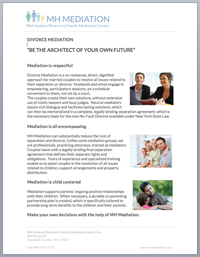Trusts in Divorce
June 18, 2023
This post is about the intersection of divorce proceedings and legal instruments known as trusts. A trust places certain assets of the person who creates the trust (called a settlor) in the hands of a trustee, who is obligated to manage the assets in accordance with the settlor’s instructions. In this way the assets are controlled as to their use and become unavailable for other purposes.
Trusts are utilized for various purposes including but not limited to estate planning purposes, for tax planning, or for protecting children of a prior marriage when a parent remarries. On occasion a person will set up a trust to attempt to avoid creditors. Trusts can also be used in connection with effectuating the terms of a prenuptial or postnuptial agreement.
In our practice, we see trusts that were created in connection with prenuptial or postnuptial agreements, which can be helpful. However, we also see situations where there are no such agreements and certain marital assets were placed in trust during the marriage not in connection with any written agreement of the couple. This can severely complicate the divorce, including raising the question of whether those marital assets placed in trust are accessible by a divorce court. There is no easy answer to this question. The answer lies in extensive research, examination of records, the nature of the assets, the background of the parties, and the terms and type of trust. Whether the trust was created by a third party or by one or both of the divorcing spouses can make a difference, as can who are the beneficiaries of the trust, the settlor’s instructions to the trustee, and the legal standard pursuant to which the trustee can distribute trust assets.
The complex question of the court’s access makes it absolutely necessary, when a trust is involved, to have an experienced divorce attorney, one who knows the latest developments in this area of law. The divorce attorney may need to consult with other attorneys specializing in trusts and estates, tax and sometimes bankruptcy. These professionals can work together to try and optimize outcomes that are critical in divorce, including division of the assets and issues related to spousal support and child support.
Not every divorce involves a trust. When it does, there may be ways to accommodate trusts, or attack them if necessary, in order to access marital assets and/or to divide assets to allow for equitable distribution. Sometimes it’s desirable to undo the trust; other times it’s desirable not to undo it. If the divorce were a science experiment, the caution would be, “Don’t try this at home!” In other words, when a divorce involves a trust, your number one step should be to recognize that you need experienced professionals who can help you develop options.
Contact our office today to schedule a consultation to discuss your divorce and family law questions, whether there is a trust, you are contemplating setting up a trust, or there is no trust at all.
By Brett E. Jones


